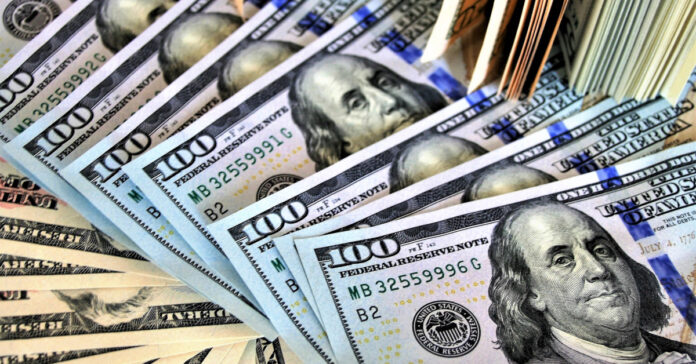
In July, Joe Biden said “It’s highly unlikely that long-term inflation is going to get out of hand.” Somebody needs to tell him it’s out of hand and is showing no sign of letting up.
This week, Biden said he wants to tackle inflation by “stabilizing the supply chain.” That sounds good, but it won’t solve the problem, and it’s an attempt to deflect blame from his economic policies. The problem is his monetary policy, too much quantitative easing, too much government spending, and a deficit that is growing faster than the economy. A big cause is the government’s practice or borrowing money from the Federal Reserve, which is the modern-day equivalent of printing money. That’s what is devaluing the dollar.
What came first, too much money or too little supply, is not like asking which came first, the chicken or the egg. We know that too much money (from boosting the money supply) caused the demand, which is stressing our supply chain. One reason the ports are backed up is because we are bringing in more goods than ever before. Why? Because consumers have money to spend on new appliances, electronics, furniture and other goods. Why? Because the government has been pumping money into the stock market and directly into people’s pockets.
If we were in a recession, there would be no supply chain problem because people would buy less. Ports are backed up in part because Americans are buying more than ever. They are buying more than ever because of government stimulus, low interest rates, and easy access to cash. Americans have watched their home values go up and their retirement portfolios increase with the stock market, and they feel wealthier, so they look to spend some of that money after a bad 2020.
I’m not suggesting we stop worrying about the supply chain, but I am suggesting fixing it will not stop inflation. I’m also saying we can’t fix the supply chain until we address the money supply.
The Housing Market
Let’s look at the housing market as an example of money supply vs supply chain.
Why did the price of houses shoot up for most of 2021? The number of houses doesn’t change much, so it wasn’t because of a sudden shortage of houses. Houses were bid up because the stock market had gone up so much in 2020 and 2021 that people suddenly had more money to spend. Low mortgage rates also contributed to this.
You might argue that houses were staying on the market only for a few days before they got snapped up, meaning there must have been a supply shortage. Supply did not change, demand did. Demand increased faster than supply, which resulted in desperate buyers bidding up prices, or housing inflation. Demand increased because of easy money.
So What?
So what does this mean to you and me, individual consumers and preppers? Do we care whether it is a supply chain problem or a money printing problem?
From a pocketbook perspective, it doesn’t make much difference. We are all going to be paying more either way.
Here’s where it matters: When a politician or someone else blames the supply chain, you need to realize that they are trying to deflect blame away from themselves. They say something like, “Companies manage the supply chain, so there’s very little the government can do to stop inflation.” First, that’s not entirely true since the government regulates the supply chain and could relax regulations to speed up some aspects of the supply chain. Second, that’s just a clever way of trying to avoid taking responsibility. By blaming those “evil corporations,” the government is trying to keep you from pointing the finger at them.
I say: Point the finger at them. Don’t let them make excuses. Hold your congressional representative and senators responsible for their past actions and votes. Tell them to stop spending money we don’t have. Call them up, and tell them to stop giving away money because it makes every dollar in your pocket worth less.
Two Ways Forward
There are two paths that the government can take: Continue pumping money, keep interest rates low, inflate the S&P 500, and keep the engines running until inflation and eventually hyperinflation render the dollar worthless. Or, try a controlled decent in which the pumping stops, interest rates rise, and we probably see a recession.
The first option is easy and has momentum, but spending more to control inflation makes about as much sense as borrowing more to control spending. The second option requires a careful balancing act and will be extremely difficult to pull off, but I think it’s the best choice. I look option one as an explosion and option two as an implosion. Both are damaging, but I think pulling back and exerting some control is better than letting a runaway experiment with Modern Monetary Theory blow up in our faces.
Video of the Day
Below is a politician’s advertisement that has nothing to do with inflation or the economy, but I’m concluding today’s post with it because I like its key message: “Without gun rights, before too long, you have no rights.” I wish more politicians recognized that.






